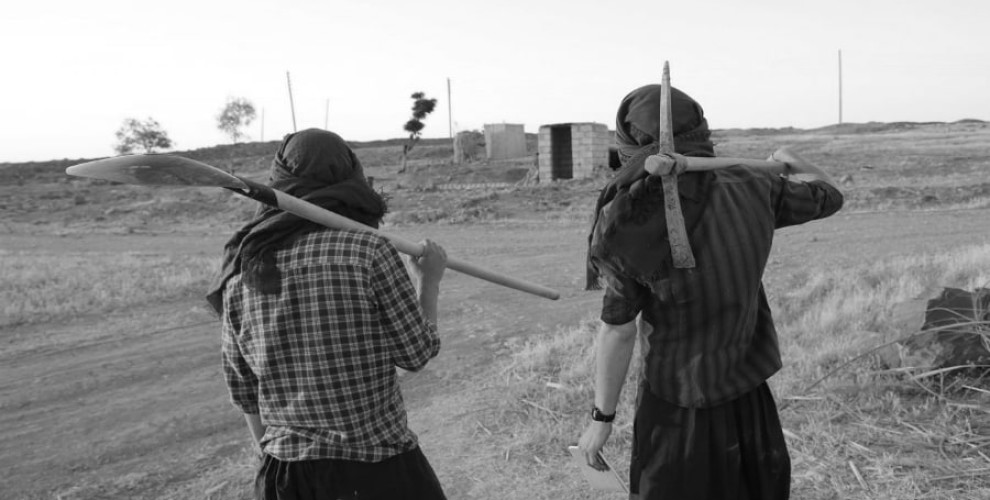The Rojava Revolution is a breach in the capitalist system
A Catalan internationalist speaks of his experience in the Rojava Commune.
A Catalan internationalist speaks of his experience in the Rojava Commune.

In an interview published in La Tinta, Rok Brossa, one of the internationalists who joined the International Commune in Rojava, talked to Leandro Albani about his experience in the Autonomous Northern Syria Federation.
Brossa is catalan, his grand grand father was a militant of the Barcelona branch of the Work National Confederation (CNT) and was murdered when the fascist franquists entered the city during the Spanish Civil War.
Brass' grandmother, left without dad when she was only five, would tell her grandchild of the times when the fascists bombarded the city and the family would hide beneath the bed mattress.
On the phone with Albani, Ross, 28, says that “one of the most important thing when it comes to develop a militant personality is to know yourself. Here in Rojava we are working on this: understanding the history of your society helps you to know yourself better. And this in turn helps to understand society better”.
Brossa arrived in Rojava in 2017, to join the internationalists who are working with civilians and had his big encounter with war in Afrin, under Turkish occupation since 20 January.

“When I was in Afrin, under the Turkish fascist bombs - said Brossa - I couldn’t help remembering my grandmother story and I understood it much better. The first time you see bombs falling from the sky it scares you and you just think about protecting yourself and the people near you. But then you learn to live with it and think that if the bomb hits you, no matter what you do, it would kill you”.
Recalling what drove him to Rojava, Brossa says: “I came here for ideological reasons. The Rojava Revolution is a breach in the capitalist system and the hegemony of the nation-states. It defies the society’s patriarchal model. So I came here to learn about the revolutionary movement which has helped opening this breach, to support the ongoing revolution and to help organising the international solidarity”.
Brossa in Barcelona was part of Rojava Azadî, a collective born after the heroic resistance in Kobane and when a space opened for internationalist work, he didn’t hesitate in moving to Rojava. “Internationalists - he said - are welcomed in Rojava. We are working from our experiences to identify and solve the difficulties we had experienced and so facilitate the integration of future internationalists. The main thing is to learn about culture and society, not just of Rojava but of the whole Kurdistan and the Middle East, so to understand better the needs and what we can actually do to help”.

A plurinational commune
The internationalist commune in Rojava was created in 2017, writes Albani, as a space of study, production and coordination of the solidarity work in the North of Syria. The commune hasn’t got a physical place as its members move around Rojava to help civilians but also to help building the new democratic tools implemented in the territory. The Commune also opened an Academy, in the Cizire Canton, aimed at “open a space where we can learn the language and the culture but also debate about our role in the revolution and what internationalism means in our times”, says Brossa, who adds that “as well as help with the different tasks within the society, we have decided to focus on ecology, which is one the of the pillars of the Democratic Confederalism”.
One of the first campaigns launched from the Commune was the “Make Rojava Green Again”, to help to reforest Rojava and reclaim a sustainable agriculture.

Democratic Confederalism in practice
Rojava is somehow the concretisation of the Democratic Confederalism concept envisaged by Kurdish People Leader Abdullah Ocalan.
“The most important achievement - says Brossa - is no doubt the very existence of a space such Rojava. The self-administration developed on the basis of the Democratic Confederalism in the north of Syria has been able to arrest the violence and terror spread by DAESH while at the same time developing a process of social revolution. It is a source of hope for those who dream of a better world”.
The Rojava model success lies in the “ability to integrate the society into the Revolution - says Brossa - building the social system on a model of plural and democratic people’s communes”.

As to what the Kurdish movement defines as a “tactical alliance” with the US, Brossa is very clear in his answer and somehow it should make some left around the world feel at least a bit ashamed of having quickly put aside the brave Kurdish people who fought - as many times its people’s defence units have repeated - against DAESH not just to free themselves but mankind.
“If there were a revolutionary internationalist movement able to help the revolution like it happened in the Spanish state with the international brigades in 1936, perhaps things would have been different”.

Afrin was deliberately targeted by Erdogan
As to why the Turkish state decided to invade Afrin, Brossa recalls that “Afrin was bringing a special diversity to the diplomatic balance of the Northern Syria Federation, which better relations with the Syrian Army and the government of Bashar al-Assad”. This balance was what Turkey wanted to break.
Brossa ends the interview underlining that “after Afrin, the solidarity with Rojava is entering a new stage and we, from the Commune, hope that this solidarity will translate in something concrete coming not just from Europe but from other parts too, like Latin America. The example of Alina Sanchez (Legerîn Ciya) - says Brossa - the Argentinean doctor who joined the YPJ and died in a car accident while going to Hasaka, on 17 March, was for all of us a great example”.